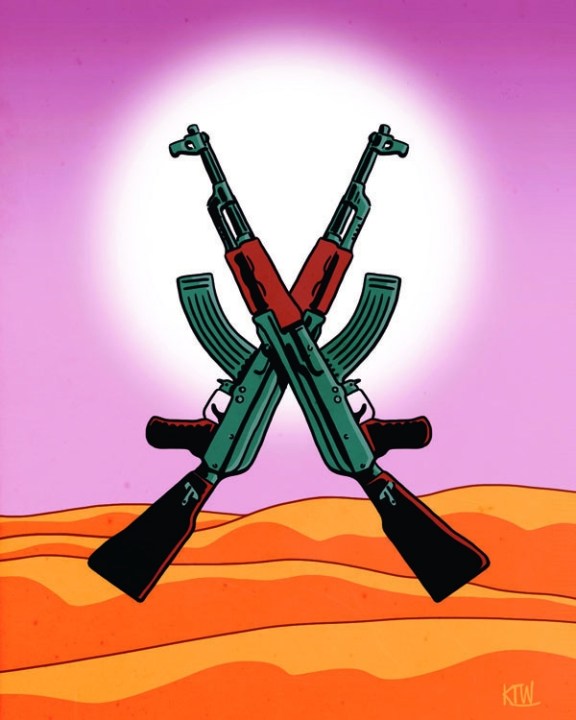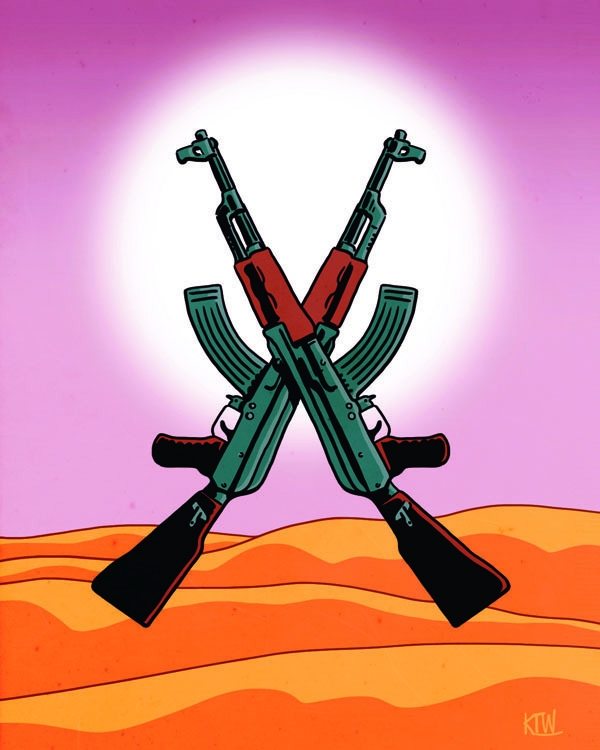The battle had the busy, obsessive yet irrelevant air of a point-to-point. It was a social event, held outdoors, a good place to see and be seen. The jeunesse dorée of the western Libyan town of Zuwara were out in force. People had come from miles around. Rather than tweed suits and barbours they were wearing battlefield fatigues and clung to machine-guns and rocket-launchers. As artillery rounds and bullets whistled overhead, the Zuwarans made informed comments, ducking when the shooting got too close. Half a mile ahead, street fighting had already claimed some 20 lives and inflicted 300 casualties. Welcome to post-revolutionary Libya.
•••
We slept overnight in the Dolphin Hotel on the edge of Zuwara, about five miles from the front and converted into a field hospital. From the roof there was a spectacular display of tracer on the near horizon and we went to sleep to the heavy pounding of artillery. The following morning a ceasefire had been called so we drove across the devastated front line, the heavy smell of cordite in the air and ruined houses still smoking. When we met the other side — Arabs from the neighbouring town of Rigdolen — they were no more capable than the Berber Zawarans of presenting a convincing account of what everyone was fighting about. We guessed that at the heart of it were ancient feuds and control over local smuggling rackets.
•••
In post-revolutionary Libya there is only an apology for a central government and no rule of law, just heaps of armed men, none of whom have the slightest intention of giving up their weapons. The day after we arrived we were told that the manager of the Rixos, the most opulent hotel in town (where dozens of journalists were held in luxurious captivity in the final days of the regime), had been kidnapped. The Rixos had the misfortune to be ‘liberated’ by a militia from Zintan in Libya’s remote western mountains. For the last six months the Zintan fighters had remained in situ, enjoying the hotel’s hospitality, until at last the daring Turkish general manager Sukru Kocak decided to present them with a bill. Inevitably they kidnapped him and beat him up. But everything ended happily. The Zintan militia are still at the hotel, only now they are security guards. Imperturbable Mr Kocak explained to us that ‘we have a saying in Turkey that all good friendships begin with an argument’.
•••
The most important asset of the Zintan militias is not, however, the Rixos. It is Saif al-Islam, son of the late Colonel Gaddafi, and former associate of, among others, Nat Rothschild, Peter Mandelson and Tony Blair. Saif Gaddafi is wanted by the International Criminal Court for crimes against humanity and if he ever gets to court it threatens to be the trial of the century. Mr Gaddafi is likely to pursue a version of the Nuremberg defence used by Hermann Goering after the second world war and seek to implicate others — intelligence agencies and corporate interests as well as western leaders — in his crimes. With so many powerful interests having so much to lose it seems at best doubtful whether Mr Gaddafi will survive to tell his story. Meanwhile Zintan is still refusing to hand him over to the national government in Tripoli because its warriors have not been paid for their role in the revolution.
•••
The irrelevance of the national transitional government became even more apparent when we visited a detention centre at Gharyan an hour’s drive south of Tripoli. The inmates were blacks, most of whom had been caught sneaking into Libya from sub-Saharan Africa in search of work. The thoughtful and engaging camp commander, a former English teacher called Emad Sagar, claimed to have played for Manchester City under-19s when he lived in England in the 1990s. He was happy to allow us to look around and talk to the prisoners. Conditions were wretched, with poor sanitation, bad food and (the prisoners said) regular beatings. After a traumatic hour in the prison compound we confronted Mr Sagar with their assertions that conditions were terrible. Mr Sagar shrugged his shoulders. ‘I agree with them. Help them please.’ Mr Sagar explained that he received no help of any kind from the government, that his militia fighters were untrained as prison guards, and that the only way he could feed the prisoners was by stealing from local businesses at gunpoint.
•••
Gaddafi’s palace, a picture of total and complete devastation, has become a sanctuary for the victims of the revolution. Every single member of the black Tawerghan tribe has been ethnically cleansed from their native Misrata, accused of collaboration with Gaddafi. We met a family of Tawerghans at Gaddafi’s palace. With deep symbolism they had constructed a pathetic little home among the ruins.
•••
Elections were due to be held on 19 June. While these seem far from certain to go ahead, there is at least one reason for hope: the war graves at Benghazi, desecrated by Salafis last March. The broken headstones have been removed and the work of restoration is well under way.
Unreported World: Libya — My Week with Gunmen can be seen on Channel 4 on Friday 1 June at 7.30 p.m., and at www.channel4.com/unreportedworld.







Comments